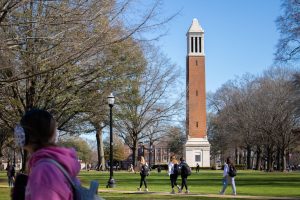Opinion | The University of Alabama needs sleeping pods on campus
November 13, 2022
There are many students at The University of Alabama who commute from off-campus apartments, meaning they can’t always go home to rest in between classes and frequently spend all day on campus.
It is no secret that college students are usually sleep deprived due to various responsibilities of school and extracurricular activities. According to an October 2021 article from the Ohio State University, most college students only get around six hours of sleep.
Based on a study conducted by researchers at the National Library of Medicine in June 2014, lack of sleep in college contributes to “lower grade point averages, increased risk of academic failure, compromised learning, impaired moods, and an increased risk of motor vehicle accidents.”
Schools across the country such as the University of Akron, Washington State University, and James Madison University have implemented sleeping pods in spaces like their student recreation and wellness centers and other academic buildings to combat the impacts of lack of sleep. UA students deserve resources like this, too.
A sleeping pod is a large piece of furniture that individual students enter and are able to rest, have privacy, and have a nap before they tackle the rest of their day. Pods typically have a low-light environment for sleep improvement, a mattress and pillow for comfortability, and some may have speakers for calming music or white noise. Some may also be ergonomically designed for better sleep functionality as it applies to the human body.
In addition to ergonomic support, low-light environments and soothing sounds, timing also plays a huge factor in sleep effectiveness. A twenty to thirty minute nap can increase alertness and give students an extra boost for the day without the feelings of grogginess.
Pods that have timers are able to offer a calm wake-up as opposed to a loud alarm that could disturb or disrupt classes nearby. In offices, sleeping pods are usually attached to the workplace and are seen as a huge benefit for employees. An article by Pod Time, a company that creates and sells sleeping pods, states it believes in “time out, not burn out.”
If the workplace is able to recognize that a short resting period throughout the day would mean more attentiveness, better cognitive processing and improved moods, then the students at The University of Alabama are likely to experience those same benefits.
The three pillars of wellness are nutrition, exercise and sleep. On our campus, we have two out of the three. We have dining halls to refuel our bodies with the nutrients we need, we have a recreation center as a facility that has a multitude of activities and sports to keep our bodies exercised and healthy, but what we are missing is a place to rest and sleep.
There are enough buildings on campus to house an adequate amount of sleeping pods for students. Students who do not live on campus and are not able to commute back to their homes in between classes, should feel they have a space for rest and relaxation.










